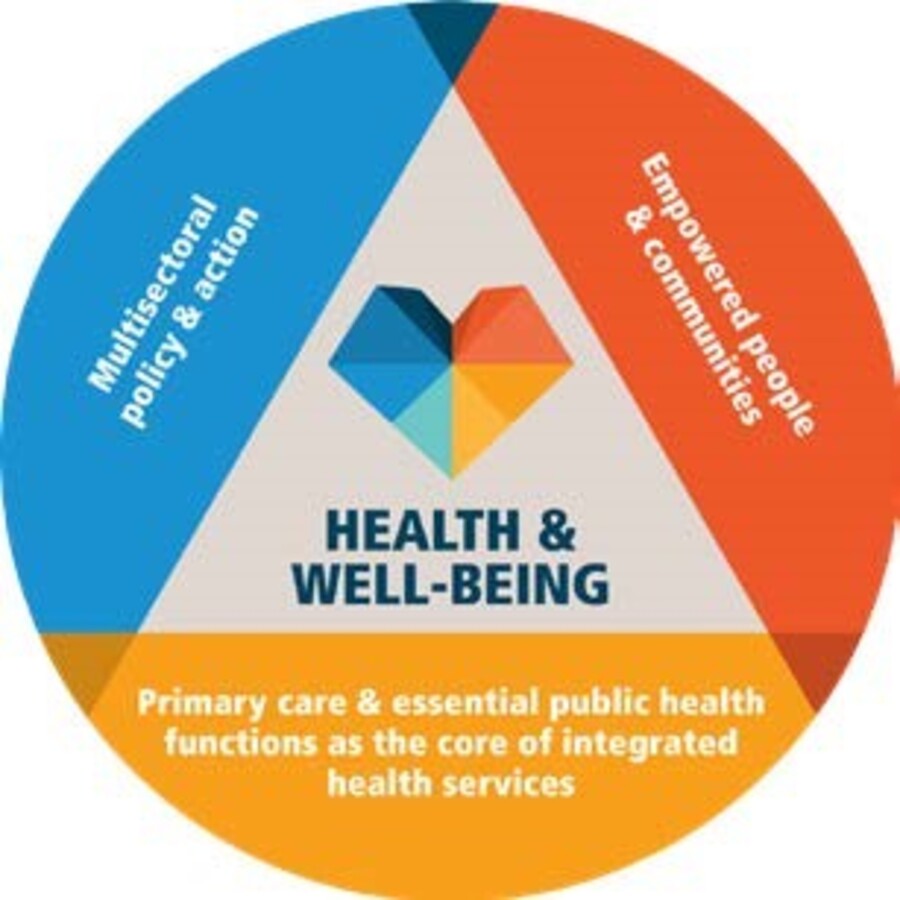Main Second Level Navigation
Breadcrumbs
- Home
- Starfield Summit 2025
- About the summit
About the Starfield Summit
With less than 5 years left before 2030, the need has never been more urgent to strengthen Primary Health Care as the necessary means to progress towards universal health coverage and the Sustainable Development Goals.
Primary Health Care (PHC) refers here to “a whole of society and whole-of-system approach that aims to maximize the level and equitable distribution of health and well-being by focusing on people’s needs and preferences as early as possible along the continuum from health protection and promotion, to disease prevention, treatment, rehabilitation and palliative care”; through the interaction of three inseparable components:
- Empowered People and Communities
- Multi-sectoral Policy and Action
- Primary Care and Essential Public Health Functions at the Core of Integrated Health Services.

About the Office of Health System Partnerships
The University of Toronto Department of Family and Community Medicine (DFCM) is a World Health Organization (WHO) Collaborating Centre on Family Medicine and Primary Care.
The Centre is the first of its kind in the world to have a specific focus on family medicine, and one of few in the world with a focus on primary care and primary health care. As a collaborating centre, DFCM assists the WHO in researching, evaluating and strengthening family medicine and primary care at a global level and in countries around the world. This recognition reflects the depth and richness of DFCM and the department’s reputation as an international leader in family medicine and primary care education and research.
We are honored to host the 2025 Starfield Summit, exploring the Role of Family Medicine in Advancing Primary Health Care (PHC), and we look forward to the impactful discussions and connections this summit will generate.
The Role of Family Medicine in Advancing PHC
Family medicine as a discipline, and the family medicine health workforce, can potentially enable the re-orientation of health systems to the PHC approach as their respective principles are closely aligned.
Traditionally, family medicine has been rooted (and practiced) in the community and has been responsive to the needs of a defined population. It is practiced by family physicians, increasingly favoured to work in inter-disciplinary teams composed of varying combinations of health workers who may or may not have been trained to deliver primary care services according to the principles of family medicine. The term “family medicine” is used here synonymously with “general practice” and “family physicians” with “general practitioners” (GP) where they align with the general description given above.
As noted by Starfield, where practiced in models of care purposefully designed to that end, family medicine can be a particularly rich contributor to quality primary care acting as its central pillar. Yet, despite an increasing presence around the world, family medicine/general practice continues to face significant challenges.
Where family medicine is well-established as the foundation of the health system, as in Canada and many other countries, the broad domain of primary care currently faces significant struggles including difficulty in recruiting and retaining an adequate workforce across all disciplines, in meeting the needs and demands of increasing complex patients, and in adapting to evolving teams-based models, new digital tools, and rising administrative burden.
Where it is emerging as a discipline, and in settings with a relatively low numbers of physicians such as in Ethiopia, the role of family medicine in the overall health system is not always clearly defined, sometimes reflecting misunderstanding and resistance on the part of policy makers, the population and other heath providers.
Goal and Objectives
Considering the urgent need to strengthen the PHC orientation of health systems, and inviting the contributions of champions and experts committed to both PHC and to family medicine, the overarching question guiding this Starfield Summit is: How can family medicine contribute to the performance of PHC-oriented health systems, not only through high-quality primary care and essential public health functions at the core of integrated health services, but also by enabling empowered people and communities and translating multi-sectoral policy and action for health.
In addressing this question through a series of guided discussions and deliberative activities, Summit participants will:
- Share solutions and strategies to address common challenges
- Identify collectively relevant knowledge gaps
- Develop a plan for future collaboration for the generation, dissemination, application and evaluation of knowledge to optimize the contribution of family medicine to health system capacity and performance.
Approach
The Starfield Summit is envisioned as an ongoing series of meetings providing a unique opportunity for conversation among a diverse group of leaders in primary care research and policy, young and old, intended to galvanize its participants, generate important discussion for public consumption, and enable research and policy agenda-setting in support of primary care function as an essential catalyst in health system reform. It will embrace the principles of Implementation Science, which seeks to promote the integration of research into policy and practice.
This Starfield Summit will adopt a highly deliberative approach, favoring small group discussion among participants with diverse experience and expertise, interspersed with short (5-10 minutes) “curated catalyst commentaries”. Every effort will be made to drive discussions towards concrete and practical action. All participants are considered experts with unique experience to share. Over the course of the 1.5 days of the Summit, discussions will focus on a series of family medicine-related themes that will purposefully layer and weave together the three components of the PHC approach.
Expected outputs
In addition to a Summit Report, willing participants will be invited to collaborate on the following outputs, each responding to the guiding question:
- A Summit Statement
- At least one publication (or a series of publications)
- A plan for future collaboration in research and education in family medicine and health system strengthening.
- A library of “recommended resources” collated from participants’ recommendations. (Participants will be invited to submit a copy or link of published or unpublished work which they feel should be shared with the group).
